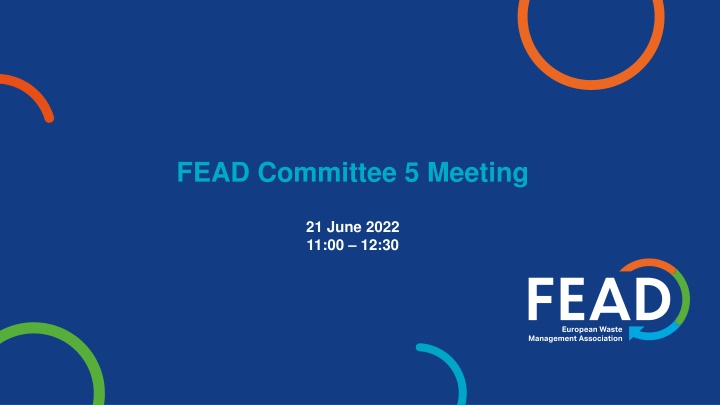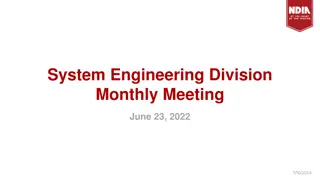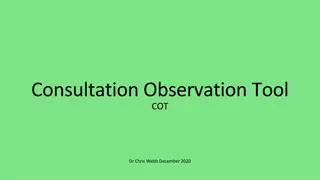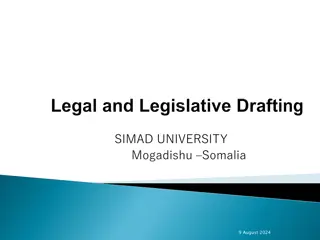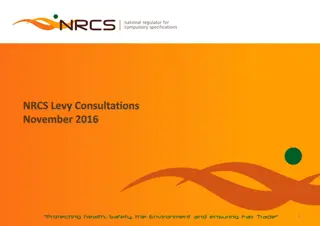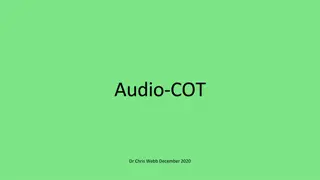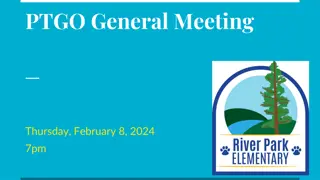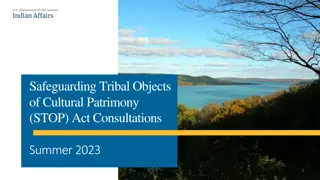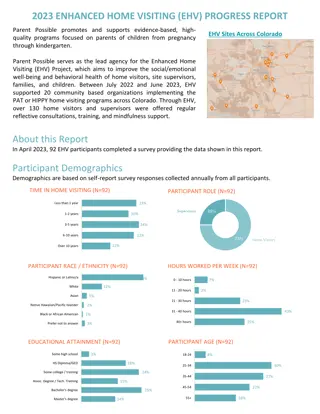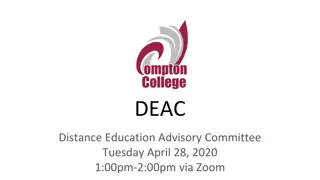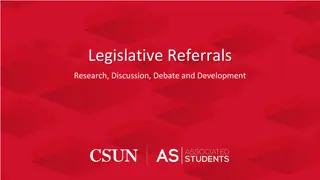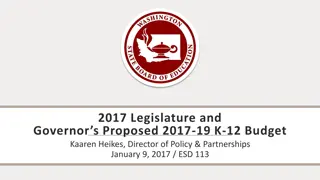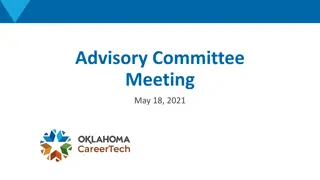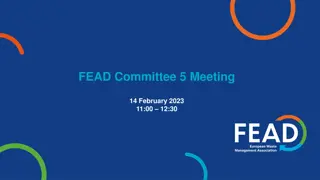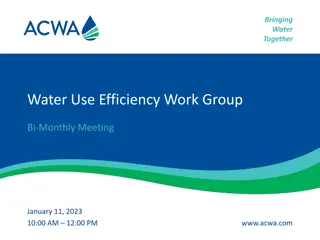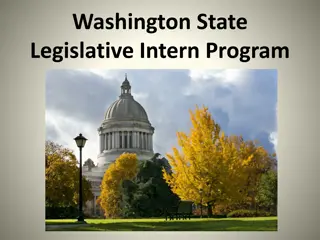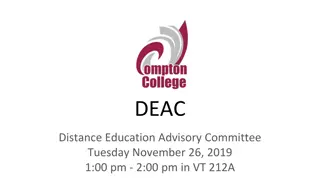FEAD Committee 5 Meeting - Updates on Legislative Matters and Consultations
The FEAD Committee 5 Meeting held on June 21, 2022, discussed various legislative updates on topics such as the IED Revision Public Consultation, exemptions for heavy metals in scrapped vehicles, and RoHS exemptions for hexavalent chromium. Members also reviewed ongoing consultations and upcoming events related to waste management regulations. The agenda included updates on Waste Oils Workshop, CARACAL and ECHA updates, negotiations on POPs Regulation, Basel Convention, ADR, RoHS Directive, Batteries Regulation, and Waste Shipment Regulation. The meeting concluded with discussions on security and fire safety in facilities.
Download Presentation

Please find below an Image/Link to download the presentation.
The content on the website is provided AS IS for your information and personal use only. It may not be sold, licensed, or shared on other websites without obtaining consent from the author.If you encounter any issues during the download, it is possible that the publisher has removed the file from their server.
You are allowed to download the files provided on this website for personal or commercial use, subject to the condition that they are used lawfully. All files are the property of their respective owners.
The content on the website is provided AS IS for your information and personal use only. It may not be sold, licensed, or shared on other websites without obtaining consent from the author.
E N D
Presentation Transcript
FEAD Committee 5 Meeting 21 June 2022 11:00 12:30
Agenda 1. Welcome and adoption of the agenda, adoption of the minutes (Meeting 22 March 2022), news from FEAD s Secretariat 2. Updates on legislative files: Decision/ Action IED Revision Public consultation Heavy metals in scrapped vehicles: updated list of exemptions Electrical equipment hexavalent chromium as an anticorrosion agent in gas absorption heat pumps (RoHS exemption) Upcoming public consultation Information Updates on Waste Oils Workshop Updates from CARACAL, ECHA Updates on POPs Regulation: EP and Council negotiations Updates on Basel Convention: second segment of BC COP-15 Updates on ADR 5th Meeting of Informal Working Group Updates on RoHS (Restriction of Hazardous Substances) Directive Waste Framework revision Online public consultation Batteries Regulation Waste Shipment Regulation revision FEAD reply to the most recent consultations and upcoming consultations FEAD upcoming events 3. Date of the next meeting and any other business Security and fires in the facilities
IED Revision Public consultation On 5 April 2022, the Commission adopted proposals for revised EU measures to address pollution from large industrial installations. FEAD Timeline: Last members feedback by Friday 17 June COB FEAD consolidated position by Tuesday 21 June COB Members approval and final comments by Wednesday 22 June COB Submission 23 June 2022
Ongoing public consultation Heavy metals in scrapped vehicles updated list of exemptions (deadline 01/07/2022) The current exemptions 2(c)(i), 3, and 5(b) in Annex II permit the use of lead in aluminium alloys, copper alloys and in batteries. Annex II to the ELV Directive provides that exemptions 2(c)(i), 3, and 5(b) shall be reviewed in 2021 Aluminium alloys: the use of lead should be prolonged and the exemption will be removed as of 1 January 2028; Copper alloys: the use of lead should be prolonged and a review is recommended in 2025 Batteries: 5(b)(i) would continue the exemption on lead in batteries used in 12 V applications, with a review recommended in 2025. 5(b)(ii) would allow the use of lead in batteries in 24 V and 48 V applications until the end of 2023 Electrical equipment hexavalent chromium as an anticorrosion agent in gas absorption heat pumps (RoHS exemption) (deadline 08/07/2022) Certain hazardous substances are restricted in electrical and electronic equipment (EEE) under the Restriction of Hazardous Substances (RoHS) Directive. Specific, time-limited exemptions can be granted upon request from businesses if the necessary criteria are met. This initiative concerns a request for an exemption for hexavalent chromium as an anticorrosion agent in the working fluid of the carbon steel sealed circuit of gas absorption heat pumps, which are considered to be EEE.
Upcoming public consultation Liquid mercury waste temporary storage pending treatment for final disposal (upcoming) EU legislation allows liquid mercury waste to be temporarily stored in dedicated landfills, pending treatment for final disposal, until 31 December 2022. As the EU still has significant stocks of liquid mercury waste awaiting proper treatment, the Commission intends to extend the temporary storage period until 31 December 2025. This initiative will ensure sound management of the remaining stocks of liquid mercury waste in the EU.
Waste oils European Commission is developing the impact assessment to accompany the proposal for the revision of the Waste Framework Directive in aspects relative to measures to increase waste oil collection and to the operation of EPR systems for industrial and lubricating oils and associated collection schemes FEAD gave a response to the questionnaire by RDC Environment (EC consultant) (end of April) Waste Oil Workshop on 19/05/2022 Support EC in developing the impact assessment Support EC to accompany the proposal for the revision of the Waste Framework Directive Support EC in aspects relative to measures to increase waste oil collection and to the operation of EPR systems for industrial and lubricating oils and associated collection schemes
CARACAL Meetings 6 December 2021: Ad-hoc CARACAL on CLP Revision New hazard classes (PMT/vPvM, PBT/vPvB) in CLP Approach related to biodegradability and bioaccumulation of MOCS 27 January 2022: 43rd CARACAL Meeting Revision of REACH: actions in the chemicals strategy Reform of authorisation and restriction processes Information requirements on endocrine disruptors Increased hazard information requirements Information requirements on uses and exposure Registration of polymers Evaluation procedures 23-24 March 2022: 44th CARACAL Meeting Updates on the revision of REACH Updates on the revision of CLP 5-6 July 2022: 45th CARACAL Meeting for REACH and CLP
ECHA SCIP is the database for information on Substances of Concern In articles as such or in complex objects (Products) established under the Waste Framework Directive (2008/98/EC). It aims to ensure that the information about substances of very high concern (SVHCs) on the Candidate List is available throughout the whole life cycle of products and materials, including at the waste stage. FEAD answered to the on-line survey by ECHA with the purpose of assessment of the SCIP database FEAD attended the focus group of waste operators meeting, organized by ECHA on 20/05/2022 SCIP database is in maintenance mode now (no significant developments planned at the moment) Some manuals have been translated and uploaded. There could be something about SCIP in the next WFD revision (e.g., info requirements in the Annex). The interlinkage between SCIP and SPI (digital passport) is to be defined but most likely will not require double reporting. Details will be in the DA expected by 2024/2025. Procurement study on exposure scenarios for the treatment of waste Contact them if we want to provide case studies (HWE is very involved with this).
POPs FEAD provided their feedback to the Commission on the 23rd of December 2021 Aim of the review: update, for certain substances and groups of substances, the concentration limits set in Annexes IV and V of the POPs Regulation Annexes IV and V, determine how waste that contains POPs is treated, particularly whether it can be recycled or should be destroyed or irreversibly transformed update brings Annexes IV and V in line with Stockholm Convention and with Annex I of POPs Regulation The ENVI Committee adopted its report on 31 March 2022. The Plenary adopted its negotiating position on 3 May 2022. The trilogue started on 11 May 2022 and provisionally agreed on, HBCDD: 500 mg/kg + review clause to lower that value to 200mg/kg, 5 years after entry into force PBDE s: 500 mg/kg + 3 years after entry into force to 350 mg/kg + 5 years after entry into force to 200 mg/kg On 20 June, the Council and the Parliament reached a provisional deal concerning the revision of annexes to the POPs Regulation in order to set further restrictions to the presence of these substances in waste. The provisional political agreement will first be submitted for endorsement by the Committee of permanent representatives. A formal adoption procedure will then be launched. FEAD Board meeting on 22nd of March, agreed on a position Asking for a transition period of 5 years for applying the new concentration limit of 500 mg/kg
Basel Convention Second segment BC COP-15 face-to-face 6-17 June 2022 in Geneva Amendments to Annexes II, VIII and IX: all transboundary movements of e-wastes (whether hazardous or not) are subject to the prior informed consent of the importing state and any state of transit. Technical guidelines on mercury wastes adopted, as well as three updated technical guidelines on the environmentally sound management of wastes from POPs. Other adopted technical guidelines included the environmentally sound incineration of hazardous and other wastes as covered by disposal operations D10 and R1, and the environmentally sound disposal of hazardous wastes and other wastes in specially engineered landfill (D5). Decisions to update the technical guidelines on the environmentally sound management of waste lead-acid batteries, to initiate the development of technical guidelines on the environmentally sound management of other waste batteries, and to move forward on electronic approaches to the notification and movement documents. Agreed to further consider the amendments put forward by the European Union to amend Annex IV of the Convention. Meetings documents can be accessed from the meetings documents page.
ADR: 5th meeting of the Informal Working Group on the Transport of Hazardous Waste 15 and 16 June 2022 in The Hague & online 10 MS present (in person & online) Agenda points: Presence of hazardous household waste (aerosols) in the (selective) collection of non-hazardous waste (e.g. empty packaging) The IWG agreed that FEAD should make a proposal to fit the current situation in the ADR with due consideration to the scope which should be sufficiently and properly limited to avoid a loophole e.g., for chemical waste, or separately collected hazardous household waste. Transport of packaged waste, inner packagings packed together + Chemical compatibility for single plastic packaging FEAD prepared an overview and comparative table with national derogations, which were used as basis for a proposal of a common solution to be introduced in the ADR. FEAD will submit INF documents for September session of the JM. Official proposals will follow according to the feedback of the JM. Transport of fixed asbestos and manufactured articles containing asbestos The IWG agreed that there are divergencies in the interpretation of SP 168, especially linked to the fact that it was not originally meant for waste. The IWG also agreed after discussion to follow the French approach with a new proposal to fit asbestos waste related cases in the ADR. The IWG will have a dedicated meeting to discuss the French proposal probably in November. Monkeypox virus Germany will submit a proposal for the UN SCTDG to update the ADR and propose a multilateral agreement with immediate application to cover the period until 2025.
RoHS (Restriction of Hazardous Substances) FEAD provided feedback to the call for evidence for the revision of the RoHS Directive Main aims of the review should be: Consistency of the preferred option with other pieces of legislation aiming to restrict hazardous substances, e.g. the POPs Regulation or REACH Regulation The European objectives of a high-quality recycling The chemicals strategy, where the European Commission agreed to look at how to simplify and strengthen the legal framework, foresees a move towards one substance one assessment The Commission opened a public consultation questionnaire Considering the nature of the questions, FEAD has not provided any feedback Stakeholder workshop in the beginning of September
Waste Framework revision FEAD provided feedback to the Commission s call for evidence for an impact assessment on the revision of the EU waste framework, on the 22nd February 2022: EPR scheme should not be expanded to all waste flows as the regular system EPR schemes for textiles might be a good instrument EPR schemes should not be extended to waste oils Waste oil collection and regeneration targets UCO (Used Cooking Oil) collection Reduce waste generation by introducing overall and/or product-specific prevention measures (residual household waste per capita) Commingled collection and the importance of separate collection of biowaste Provision of additional guidance Concluding remarks on the design of waste management policies On-line questionnaire Public Consultation (deadline 16/08/2022) Commission adoption planned for Q2 2023
Batteries new Regulation 10.12.2020: European Commission published a proposal for a Regulation concerning batteries and waste batteries. IMCO, ITRE and ENVI Committee at EP - last vote March 2022 From 20.04.2022: The interinstitutional negotiations (trilogue) between European Parliament and Council started, and will finish Q2 2023 First results of the trialogue: Commissions proposal: by end of 2025, the Commission shall adopt an implementing act laying down the methodology for calculation and verification of the amount of recycled content Trilogue agreed on 36 months after entry into force Key provisions for more circularity in Batteries: Mandatory recycled content, as a key signal to trigger investments High collection targets, to deliver the needed tonnages Quicker delegated acts, to allow to deploy investments on time
Waste Shipment Regulation (WSR) FEAD provided feedback to the Commission s proposal in January FEAD had two online meetings with the rapporteur's office in February and March, and participated in a public hearing organised by her in March Draft ENVI Report published on 11 April FEAD had a further meeting with the rapporteur s office to provide feedback on the report in May 599 amendments tabled in May FEAD shared its feedback to the first amendments in June Council: 7 meetings and next discussion to take place in the Environment Council of 28 June. Concerns about short deadlines in procedures Questions were raised about the practical implementation of the audits Some delegations argued that the provisions of the regulation should not adversely affect small states that are heavily dependent on exports for the treatment and especially the disposal of their waste Public event with Pernille Weiss, rapporteur and Mattia Pellegrini, Head of Unit DG ENV on 11 July (hybrid) EP Vote in Committee in October (tbc) EP Vote in Plenary in November
FEAD upcoming Events FEAD will speak at the EUROBAT annual forum on 24 June FEAD will give a political statement at a DUH webconference on the EU Batteries Regulation on 5 July FEAD presentation at the ECR Expert Class ADR in Osnabr ck (DE), 5 July 2022 Public event on Waste Shipments Regulation in Brussels (BE), 11 July 2022 FEAD will speak at Latvia's Green Course in Waste Management , 25-26 August 2022 CAObH/FEAD event in Prague (CZ), 22 September 2022 Other issues? Security and fires in the facilities ANY FURTHER QUESTIONS?
